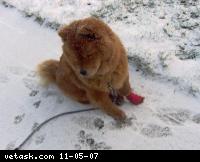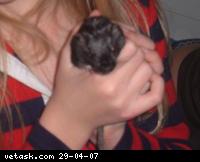Answers to Your Pet Healthcare Questions at VetAsk.com
|
| tumours in scent glands |
| Species: gerbil | Category: medical-surgical | Submitted: 20-May-07 | viewed 9190 times |
 Julie asks:
Julie asks: |
|
My gerbil is 2 and looks to have a tumour on his scent gland. Is he too old for an operation or is there any other treatment? Will an operation be expensive?
|
|
|

|
 Samantha says: Has the tumour been diagnosed by your vet? If not you will need to take your gerbil along soon for your vet to have a look at the lump. The treatment will depend upon your gerbil's general health and the type of tumour etc as well as other factors. These decisions are made very much on an individual basis and what would be right for one animal may not be so for another. Age is a factor and this will be considered, but you really need a consultation with your vet to decide what would be right in this case. Surgery can be costly, but this is a reflection of the care and expertise with which your pet is treated. Many vets do try to keep the costs down for these small creatures and you should be able to get a quote before any treatment is carried out. Samantha says: Has the tumour been diagnosed by your vet? If not you will need to take your gerbil along soon for your vet to have a look at the lump. The treatment will depend upon your gerbil's general health and the type of tumour etc as well as other factors. These decisions are made very much on an individual basis and what would be right for one animal may not be so for another. Age is a factor and this will be considered, but you really need a consultation with your vet to decide what would be right in this case. Surgery can be costly, but this is a reflection of the care and expertise with which your pet is treated. Many vets do try to keep the costs down for these small creatures and you should be able to get a quote before any treatment is carried out.
|
|
|
|
|
| Problem with hind leg |
| Species: dog | Category: medical-surgical | Submitted: 20-May-07 | viewed 13065 times |
 Graeme asks about Charlie (dog - Labrador, M) (age 9 years, 8 months):
Graeme asks about Charlie (dog - Labrador, M) (age 9 years, 8 months): |
|
Charlie had a surgical pin removed from his front right leg on 4th May 07 after a recent RTA. He was unable to weight bear on this leg since his RTA and our vet suggested hydrotherapy. He has now had six hydro sessions and his front leg is coming on great and is now fully weight bearing. However, he now seems to have developed a problem with his hind legs. For around 9 days now he has been unable to get up from the floor and stand unaided. He seems unable to walk and wobbles as he tries to get control of his hind legs. He lies on the floor constantly but does not seem to be in pain and is cheerful enough. Occasionally he does wince when I attempt to lift him to take him into the garden. Today I have noticed that when I rub his rear left leg, I can hear a ‘clicking’ sound which seems to resemble ‘bone-on-bone’ but he does not seem to show signs of pain when this happens.
I have mentioned my concerns to the hydro-therapist and she assures me that his hind legs will become stronger in a few weeks and continued therapy. Before his hydro sessions, he was fit and well although hobbling about due to his recent front leg surgery. His current problems started soon after the commencement of his hydro sessions. Could it be that the 3 sessions of hydro a week is too much for him as he is nearly 10 year old? Would a break from these sessions help his rear legs recover?
Do you think that this ‘clicking’ sound from his rear leg is anything to worry about as I know we all get creaky bones as we get older?
Any advice would be extremely appreciated.
|
|
|

|
 Samantha says: You must speak to your vet about this soon. Charlie may need x-rays to determine what is going on. The "clicking sound" you mention concerns me as does the inability to walk- so please phone your vet and make an appointment for Charlie as soon as you can. Hopefully it will be nothing serious, but it should definitely be checked. Samantha says: You must speak to your vet about this soon. Charlie may need x-rays to determine what is going on. The "clicking sound" you mention concerns me as does the inability to walk- so please phone your vet and make an appointment for Charlie as soon as you can. Hopefully it will be nothing serious, but it should definitely be checked.
|
|
|
|
|
| ticks |
| Species: dog | Category: parasites | Submitted: 19-May-07 | viewed 10123 times |
 Rosie asks:
Rosie asks: |
|
I think I've found a tick, but is it?
|
|
|

|
 Samantha says: A tick usually looks like a pale white to dark grey wart like lump in the fur. Ticks may be found anywhere on the body but are often most noticeable around the face, ears and paws. They are variable in size depending on the stage of the life cycle and how much they have fed. Since you are in doubt and it is impossible for me to help over the internet in this situation you should seek professional advice. Samantha says: A tick usually looks like a pale white to dark grey wart like lump in the fur. Ticks may be found anywhere on the body but are often most noticeable around the face, ears and paws. They are variable in size depending on the stage of the life cycle and how much they have fed. Since you are in doubt and it is impossible for me to help over the internet in this situation you should seek professional advice.
|
|
|
|
|
| Moving cat |
| Species: cat | Category: other | Submitted: 18-May-07 | viewed 10462 times |
 Maria asks about Misty (cat - Chinchilla, M) (age 15 years, 8 months):
Maria asks about Misty (cat - Chinchilla, M) (age 15 years, 8 months): |
|
My cat is 16 years old and very attached to me. He has a very timid nature when it comes to other people. I got married 10 months ago and moved out of the family home. As we were going to rent a house until our new home was built, I didn't want to take my cat with me and upset him. As such my cat who used to be both an indoor and outdoor cat has now become solely an outdoor cat. Although he is an outdoor cat, due to his age he does not venture out further than the backyard. I would like to take my cat with me to the new home in 3 weeks but am concerned as to how he would adapt. He is very content at the current family home and I visit him each day so he does not feel neglected. The other issue is that I am expecting a baby in a couple of months and don't know if this will further upset my cat. I know that if my cat is with me at the new home he will find it easier to adjust as I will always be around, however given his age and the fact that cats are very attached to their surroundings, will he adapt well in my new house? He will be an indoor cat at night and indoor/outdoor by day, depending on what he prefers. Initially I plan on settling him inside for approx 3 weeks before even taking him outside.....
|
|
|

|
 Samantha says: Congratulations on the wedding and the forthcoming baby! You are going to be very busy and there is going to be lots of upheaval- all of which will be wonderful for you- so good luck and my very best wishes! However this is all going to be something which your cat may find a little bit difficult to deal with at first. Samantha says: Congratulations on the wedding and the forthcoming baby! You are going to be very busy and there is going to be lots of upheaval- all of which will be wonderful for you- so good luck and my very best wishes! However this is all going to be something which your cat may find a little bit difficult to deal with at first.
It is impossible to say how he will adapt to his new surroundings because every cat is different, however I can give you a few tips which would hopefully help him to adjust.
Firstly try to get everything as settled as possible in your new home before bringing your cat home (if this is an option). This means trying to get most of the unpacking and general upheaval done before your cat moves in. Cats do not like changes in their environment so try to have furniture in its final place and packing boxes empty and out of the way. Try to ensure that your cat has a quiet place to go when he feels stressed, preferably with a high resting place such as a comfortable shelf; this will allow him to survey his new home from a high vantage point and plan his moves when he feels safe to do so (this is important for cats). A hidy-hole with three enclosed sides may also help (leave him alone when he is inside this- he should feel totally in control of this area and hands, faces and arms encroaching into this space will not give him this sense of security.) He will venture from these areas when he feels safe to do so. Feed him on a shelf if possible since this will also help him feel safe; it will also help when baby starts crawling- cat food can be very appealing to babies/toddlers! You might like to consider using Feliway as a diffuser or spray around your home for a while - this is an artificial pheromone which helps cats to relax. Make sure your cat has access to a litter tray indoors in a quiet area in case he does not feel safe to use the garden at first. (Get somebody else to clean it while you are pregnant though) It will probably take time but hopefully your cat will do well provided the home is kept as calm as possible for the first few weeks. In my experience cats and young babies do well together (don't let the cat in the cot though- babies can be warm and snugly and therefore quite attractive for a cat to sleep with!) Problems more often occur when the baby gets mobile- provide escape routes for the cat to prevent accidents! I hope this helps and good luck with everything!
|
|
|
| walks |
| Species: dog | Category: other | Submitted: 16-May-07 | viewed 11227 times |
 Patricia asks about harvey (dog - papillon, M) (age 1 years, 11 months):
Patricia asks about harvey (dog - papillon, M) (age 1 years, 11 months): |
|
How many times should a small dog go out for a walk?
|
|
|

|
 Samantha says: This will obviously depend upon the type and age of the dog, the amount of other stimulation and games offered through the day, and of course the length and interest of the walks offered. Dogs are just like us and like to have a varied and interesting life so take your dog out and about as much as you can (so long as your dog seems happy and there are no health problems such as arthritis). I would say that two walks per day would be the absolute minimum for a healthy small breed dog, but the length of the walks should be tailored to your dog's needs- so if your dog is still jumping up and down and eager for another walk as soon as you get home you will need to go for longer walks or perhaps provide some fun games such as fetching a toy during the exercise period. Access to a garden and interactive play with another dog or person can also be stimulating for dogs and could take the place of some walking. Samantha says: This will obviously depend upon the type and age of the dog, the amount of other stimulation and games offered through the day, and of course the length and interest of the walks offered. Dogs are just like us and like to have a varied and interesting life so take your dog out and about as much as you can (so long as your dog seems happy and there are no health problems such as arthritis). I would say that two walks per day would be the absolute minimum for a healthy small breed dog, but the length of the walks should be tailored to your dog's needs- so if your dog is still jumping up and down and eager for another walk as soon as you get home you will need to go for longer walks or perhaps provide some fun games such as fetching a toy during the exercise period. Access to a garden and interactive play with another dog or person can also be stimulating for dogs and could take the place of some walking.
|
|
|
| colouring of dog's skin |
| Species: dog | Category: other | Submitted: 16-May-07 | viewed 10863 times |
 Ann asks about sadie (dog - westhighland, F) (age 2 years, 4 months):
Ann asks about sadie (dog - westhighland, F) (age 2 years, 4 months): |
|
My dog's belly colour was a wonderful pink colour now it seem to be black. Is this normal in a westie?
|
|
|

|
 Samantha says: This may indicate a chronic skin problem such as an allergy or atopy (which is very common in WHWs). Take her along to your vet as she may be in discomfort even though she may not show signs of distress. Samantha says: This may indicate a chronic skin problem such as an allergy or atopy (which is very common in WHWs). Take her along to your vet as she may be in discomfort even though she may not show signs of distress.
|
|
|
| Swollen thighs |
| Species: cat | Category: medical-surgical | Submitted: 16-May-07 | viewed 10116 times |
 Mariah asks:
Mariah asks: |
|
My cat kitten, Nutmeg, got accidentally run over last night on the lower half of her back. She now has swollen thighs, and she is bleeding just below her butt. She can move her legs and kind-of move her body but not very much. What do I do? (Is there any at home things I can do for her right now before we take her to the vet if she gets worse?) Oh, one more thing she is still eating and drinking normally.
|
|
|

|
 Samantha says: Take her to the vet urgently; you need to find out how badly injured she is before any kind of treatment can be started. Delay could put her at serious risk. Samantha says: Take her to the vet urgently; you need to find out how badly injured she is before any kind of treatment can be started. Delay could put her at serious risk.
|
|
|
| hair loss |
| Category: general | Submitted: 14-May-07 | viewed 9807 times |
 Simon asks:
Simon asks: |
|
One of my cats has lost his fur down both legs, around his anus and about 3 inches from his tail up his back. He appears healthy, eating & drinking well. I have 3 other cats but they are fine so can I assume it's not fleas?
|
 |
|

|
 Samantha says: Some cats can develop an allergy to fleas and this is the most likely reason that one of your cats should develop a problem while the others seem fine. Of course there can also be other reasons for problems with the skin such as this, but fleas should be ruled out by treating the cats (all of them) and the household for fleas. You should take your cat along to your local vet because this type of condition is often very uncomfortable for cats, even though they may show no outward signs of distress. Samantha says: Some cats can develop an allergy to fleas and this is the most likely reason that one of your cats should develop a problem while the others seem fine. Of course there can also be other reasons for problems with the skin such as this, but fleas should be ruled out by treating the cats (all of them) and the household for fleas. You should take your cat along to your local vet because this type of condition is often very uncomfortable for cats, even though they may show no outward signs of distress.
|
|
|
| pad |
| Species: dog | Category: general | Submitted: 13-May-07 | viewed 9157 times |
 Linda asks about nebbie (dog - cow cow, F) (age 6 years, 11 months):
Linda asks about nebbie (dog - cow cow, F) (age 6 years, 11 months): |
|
I have taken her to the vet, but they want to take her foot off. Is there no cream or some thing to make her pad OK? I know she is in pain but I would try anything, can you help me?
|
 |
|

|
 Samantha says: I'm afraid it must be a serious injury if your vet feels that the only option is to remove the foot; it is unlikely that other treatments would be an option. If you are concerned you could ask your vet if they would mind if you had a second opinion from another vet able to examine the injury. If another vet also thought there was no option but to remove the paw then you would be able to set your mind at rest by knowing you were doing the only thing possible. Samantha says: I'm afraid it must be a serious injury if your vet feels that the only option is to remove the foot; it is unlikely that other treatments would be an option. If you are concerned you could ask your vet if they would mind if you had a second opinion from another vet able to examine the injury. If another vet also thought there was no option but to remove the paw then you would be able to set your mind at rest by knowing you were doing the only thing possible.
|
|
|
| Pad |
| Species: dog | Category: general | Submitted: 11-May-07 | viewed 10451 times |
 Linda asks about nebbie (dog - cow cow, F) (age 6 years, 11 months):
Linda asks about nebbie (dog - cow cow, F) (age 6 years, 11 months): |
|
My dog's pad has been cut off, it is an open wound. What can I do?
|
 |
|

|
 Samantha says: There is only one sensible thing to do and that is to take your dog to your vet. The wound will probably need dressing or suturing and possibly antibiotics and pain relief will be required. Samantha says: There is only one sensible thing to do and that is to take your dog to your vet. The wound will probably need dressing or suturing and possibly antibiotics and pain relief will be required.
|
|
|
| Bereavement |
| Category: general | Submitted: 04-May-07 | viewed 10070 times |
 Anne asks:
Anne asks: |
|
Until two weeks ago I had two beautiful cats, but one was taken ill in January and has been slowly declining in health until I had to ask our vet to come to the house to help him to die. My cats had been together for just over eleven years and the surviving cat was present when his friend died. Since then he, like me, has been grieving. He is hardly eating, neglecting his grooming and spending long periods under bushes where they both would bask in the sun. When he is in the house he sleeps in the bed of his dead friend where he makes an odd almost howling noise before sleeping. Friends have said I should remove the bed to help him recover, but I think it is helping him grieve. What is your opinion?
I know I'll grieve for a long time and I am expecting that he will take perhaps even longer. I can look at photos. All he has is his sense of smell. Any advice to help him will be most gratefully received.
|
|
|

|
 Samantha says: Grieving is natural when a friend is sadly lost. Animals, just like humans miss companions and will show signs of grief. Obviously the length of the grieving period and the severity of the problem will vary from individual to individual. I think that the removal of the bed where your other cat slept should be left to a time when both you and your cat seem ready and this is a matter which only you can judge. I know this time is hard but things will get better. I am a little bit concerned that your other cat is neglecting himself and not eating much. Cats can quickly become ill if they lose their appetites so it would be wise to check with your local vet to ensure your cat does not have any medical problem which may be making things worse (sometimes illnesses can appear at times of stress such as this). Best wishes to both of you and keep in touch if you feel you need to. Samantha says: Grieving is natural when a friend is sadly lost. Animals, just like humans miss companions and will show signs of grief. Obviously the length of the grieving period and the severity of the problem will vary from individual to individual. I think that the removal of the bed where your other cat slept should be left to a time when both you and your cat seem ready and this is a matter which only you can judge. I know this time is hard but things will get better. I am a little bit concerned that your other cat is neglecting himself and not eating much. Cats can quickly become ill if they lose their appetites so it would be wise to check with your local vet to ensure your cat does not have any medical problem which may be making things worse (sometimes illnesses can appear at times of stress such as this). Best wishes to both of you and keep in touch if you feel you need to.
|
|
|
| acts aggressive towards vet |
| Category: general | Submitted: 04-May-07 | viewed 10213 times |
 Betsey asks:
Betsey asks: |
|
I have a stray dog who apparently before being rescued was abused badly. She is a very sweet dog. She gets along with all of her family, including two cats and another dog (one cat and one dog who are only there part time). She has no aggressive tendencies, in fact she runs away from uncomfortable situations but when she is taken to the vet and is cornered for shots or what not she acts like she is going to eat him alive. She has been able to get all the muzzles off of her ( I usually double the muzzles and she still gets them off) as a result they have to knock her out every time which means that the vet has a difficult time diagnosing her because he can't observe the problem. Any advice? Are there any vets who specialize in aggressive dogs any suggestions would be helpful.
|
|
|

|
 Samantha says: Sorry to hear about this problem- it sounds as if your dog is incredibly fearful at the vet's where she cannot run away. A dog's reaction to a fearful stimulus such as an approaching stranger is often to run away (imagine yourself in the same situation with a stranger approaching you who may well hurt you) if running away is impossible the only option available is to fight! We can therefore at least understand her response. You probably need to consult a behaviourist to get the best chance of resolving this problem but you could try a few other things if your vet would be willing. She may be happier if the vet made a house visit so that she would be on her own territory and perhaps feel more confident. You could also try taking her along to your vet for a few visits when nothing needs to be done and maybe ask for someone to give her a treat so that she comes to think of the surgery as somewhere that nice things and people are. (You would need to speak to your vet about this as they are often very busy places). Even with the best intentions and putting lots of effort into this you may still find that she is fearful of the vet and needs to be sedated and muzzled but it would be worth trying to improve things for everyone concerned. Samantha says: Sorry to hear about this problem- it sounds as if your dog is incredibly fearful at the vet's where she cannot run away. A dog's reaction to a fearful stimulus such as an approaching stranger is often to run away (imagine yourself in the same situation with a stranger approaching you who may well hurt you) if running away is impossible the only option available is to fight! We can therefore at least understand her response. You probably need to consult a behaviourist to get the best chance of resolving this problem but you could try a few other things if your vet would be willing. She may be happier if the vet made a house visit so that she would be on her own territory and perhaps feel more confident. You could also try taking her along to your vet for a few visits when nothing needs to be done and maybe ask for someone to give her a treat so that she comes to think of the surgery as somewhere that nice things and people are. (You would need to speak to your vet about this as they are often very busy places). Even with the best intentions and putting lots of effort into this you may still find that she is fearful of the vet and needs to be sedated and muzzled but it would be worth trying to improve things for everyone concerned.
|
|
|
| Spaying |
| Category: general | Submitted: 03-May-07 | viewed 10108 times |
 Carolyn asks:
Carolyn asks: |
|
I have recently had my 7 month old cat spayed. During the night she sometimes make a yowling sound and I am concerned that she may be calling. Does it take a while for her hormones to settle down?
|
|
|

|
 Samantha says: She is unlikely to be calling following being spayed but cats can be vocal at night for many different reasons. She may want attention and play so ensure she has a good game and lots of attention for an hour or two in the evening. She is very young and would naturally be quite active at night; vocalization and attention seeking at night is a very common problem for owners of young cats simply because they want to play. Speak to your vet if you are concerned about the spay- but it would be very unlikely that she is still coming into season. Samantha says: She is unlikely to be calling following being spayed but cats can be vocal at night for many different reasons. She may want attention and play so ensure she has a good game and lots of attention for an hour or two in the evening. She is very young and would naturally be quite active at night; vocalization and attention seeking at night is a very common problem for owners of young cats simply because they want to play. Speak to your vet if you are concerned about the spay- but it would be very unlikely that she is still coming into season.
|
|
|
| diagnosed with a torn cruciate ligament |
| Species: dog | Category: medical-surgical | Submitted: 03-May-07 | viewed 13948 times |
 Douglas asks about henry (dog - cocker spaniel, M) (age 16 years, 7 months):
Douglas asks about henry (dog - cocker spaniel, M) (age 16 years, 7 months): |
|
Henry has been diagnosed with a torn cruciate ligament on a hind leg. He is 17 years old and our vet is not keen on any operation and said plenty of rest and no weight on his back leg. Is there anything we can do to make him more comfortable /help his condition, he may be 17 but still very active (well used to be).
Many thanks
douglas
|
 |
|

|
 Samantha says: Speak to your vet and find out about any alternative therapies which might help. Acupuncture can reduce pain in some situations and hydrotherapy if available in your area might help to keep him mobile without putting extra strain on his joints, physiotherapy might also benefit. Each animal is an individual and it may be that he would be stressed by one or all of these things (for example if he hates swimming hydrotherapy would do no good). These are all only suggestions to think about and you should discuss with your own vet whether they might benefit Henry. Samantha says: Speak to your vet and find out about any alternative therapies which might help. Acupuncture can reduce pain in some situations and hydrotherapy if available in your area might help to keep him mobile without putting extra strain on his joints, physiotherapy might also benefit. Each animal is an individual and it may be that he would be stressed by one or all of these things (for example if he hates swimming hydrotherapy would do no good). These are all only suggestions to think about and you should discuss with your own vet whether they might benefit Henry.
|
|
|
| noticeable limp... |
| Species: cat | Category: medical-surgical | Submitted: 03-May-07 | viewed 12518 times |
 Treasa asks about Maddie (cat - tortie, F) (age 4 years, 7 months):
Treasa asks about Maddie (cat - tortie, F) (age 4 years, 7 months): |
|
Hello, I have a question about my 5 year. old cat Maddie. I've recently noticed that she's favoring her front right paw, after resting. It seems to last for a little while, or it seems that she eventually walks it off, but it's always after she's been sitting or lying down. She is an indoor cat, who is has been healthy all of her life. There is nothing visible on her paw that indicates any discomfort, so I'm very concerned. Any help would be greatly appreciated.
Thanks,
T
|
 |
|

|
 Samantha says: Sometimes cats can suffer from joint problems such as arthritis and this often seems to give them most discomfort after resting. It would be wise to take Maddie along to your local vet who can check her leg for you and make sure that she is given any treatment she may require to help her. Samantha says: Sometimes cats can suffer from joint problems such as arthritis and this often seems to give them most discomfort after resting. It would be wise to take Maddie along to your local vet who can check her leg for you and make sure that she is given any treatment she may require to help her.
|
|
|
| Lous keeps biting and chewing on her inner legs |
| Species: dog | Category: other | Submitted: 02-May-07 | viewed 11834 times |
 Terri asks about Lou (dog - shih tzu, F) (age 3 years, 2 months):
Terri asks about Lou (dog - shih tzu, F) (age 3 years, 2 months): |
|
Can I put Benadryl cream on her legs for the itch?
|
|
|

|
 Samantha says: I would never recommend using medication without veterinary advice from a vet who is able to examine the animal concerned. Your cat may be in serious discomfort with the itch and needs to be seen by a vet before any recommendation for treatment can be given. It is always best not to use human products for pets (unless under veterinary advice) since they often react in different ways to drugs which may be safe for us, dosage etc can also vary and remember that pets will often lick creams and ointments that are applied to the skin. Samantha says: I would never recommend using medication without veterinary advice from a vet who is able to examine the animal concerned. Your cat may be in serious discomfort with the itch and needs to be seen by a vet before any recommendation for treatment can be given. It is always best not to use human products for pets (unless under veterinary advice) since they often react in different ways to drugs which may be safe for us, dosage etc can also vary and remember that pets will often lick creams and ointments that are applied to the skin.
|
|
|
| Blood and mucus in poo |
| Species: dog | Category: medical-surgical | Submitted: 02-May-07 | viewed 14062 times |
 Stuart asks about Dexter (dog - Cocker Spaniel, M) (age 0 years, 3 months):
Stuart asks about Dexter (dog - Cocker Spaniel, M) (age 0 years, 3 months): |
|
I have a 12 weeks old Cocker Spaniel
His poo has sometimes blood and mucus in it. He is on a diet of chicken, fish and rice as advised by the vet. Is this something to be concerned about. The vet advised a bland diet and that is may be caused due to the change in circumstances.
|
|
|

|
 Samantha says: Often pups get digestive upsets around the time they are re-homed and perhaps get a change in diet. The vet is obviously doing the best thing for your pup in advising a bland diet such as you describe. Often the problem eases with time but some dogs have bowel problems which persist into adulthood so keep in touch with your vet who will be able to help you to keep the problem under control. Samantha says: Often pups get digestive upsets around the time they are re-homed and perhaps get a change in diet. The vet is obviously doing the best thing for your pup in advising a bland diet such as you describe. Often the problem eases with time but some dogs have bowel problems which persist into adulthood so keep in touch with your vet who will be able to help you to keep the problem under control.
|
|
|
| tumor |
| Species: dog | Category: medical-surgical | Submitted: 02-May-07 | viewed 10292 times |
 Nancy asks about cookies (dog - Shih Tzu, F) (age 5 years, 3 months):
Nancy asks about cookies (dog - Shih Tzu, F) (age 5 years, 3 months): |
|
I think my dog has a tumor under her chin but I'm not sure, but it's like the size of a marble.
|
 |
|

|
 Samantha says: Any suspicious lump or mass should be checked by a vet as soon as possible so please take your dog along to your local vet as soon as you can. Samantha says: Any suspicious lump or mass should be checked by a vet as soon as possible so please take your dog along to your local vet as soon as you can.
|
|
|
| Sleeping problems |
| Species: dog | Category: behaviour | Submitted: 30-Apr-07 | viewed 8905 times |
 Kate asks about Charlie (dog - springer spaniel, M) (age 0 years, 10 months):
Kate asks about Charlie (dog - springer spaniel, M) (age 0 years, 10 months): |
|
Our dog Charlie is absolutely wonderful but we have one quite serious problem with him. He barks at night at least two or three times and wakes the whole house up. It makes no difference where he sleeps, if he hears a noise then he will bark relentlessly. He will bark if its windy outside, or if there is heavy rain or he hears a car etc etc. It is like he is constantly on guard but it is becoming a serious problem now. The children are being woken up every night and my husband and I both work full-time and are struggling to cope with this.
My first thought is to ask is are there medication available equivalent to sleeping tablets for humans but for dogs, or is there something herbal that works equally well.
I imagine my vet would be very reluctant to prescribe sleeping tabs for him if available, but we really are having a very difficult time at the moment.
Hope you can advise me.
|
 |
|

|
 Samantha says: This sounds like quite a serious problem for you and your family and I think that you will need professional help from an animal behaviourist to solve this one. Get in contact with your local vet or the Association of Pet Behavioural Counsellors to find a behaviourist in your area. Your vet may be willing to prescribe something to help you get through the first few weeks of behavioural therapy but this will depend upon their professional opinion and safety etc for your dog and circumstances (sometimes sedatives can make things worse!). I hope things get better soon. Also consider asking your vet about the Abiostop collar for your dog to wear at night; it squirts a citronella spray at the dog when it barks and can help where barking is a problem. Samantha says: This sounds like quite a serious problem for you and your family and I think that you will need professional help from an animal behaviourist to solve this one. Get in contact with your local vet or the Association of Pet Behavioural Counsellors to find a behaviourist in your area. Your vet may be willing to prescribe something to help you get through the first few weeks of behavioural therapy but this will depend upon their professional opinion and safety etc for your dog and circumstances (sometimes sedatives can make things worse!). I hope things get better soon. Also consider asking your vet about the Abiostop collar for your dog to wear at night; it squirts a citronella spray at the dog when it barks and can help where barking is a problem.
|
|
|
| Dog (Minnie) Attacked Gerbil. Lost Tail fur |
| Species: gerbil | Category: medical-surgical | Submitted: 29-Apr-07 | viewed 9169 times |
 Hazel asks:
Hazel asks: |
|
What shall I do about the gerbil? I think he has a broken leg. He is going nuts trying to escape from the cage. What shall I do?
|
 |
|

|
 Samantha says: Take him to your vet; he may be in a lot of pain! He also needs his injuries assessed properly and perhaps treatment to prevent any bite wounds becoming infected. Samantha says: Take him to your vet; he may be in a lot of pain! He also needs his injuries assessed properly and perhaps treatment to prevent any bite wounds becoming infected.
|
|
|
|
|  |

|
Want the EBook but don't want to register yet?
|
|
You can buy and download the book right away by clicking the "Buy Now" button! Immediate download following successful payment processing (takes about a minute via PayPal.)
|
 |
|
|
 |
|
Download Free for Registered Users of VetAsk: "Everything You Ever Wanted To Ask The Vet About Fleas" 7500-word EBook by Samantha Coe BVetMed MRCVS
|
What's in the Flea EBook from VetAsk?
- Have you ever wondered why your vet says your pet has a flea problem even though you have never even seen a single flea?
- Or why only one of your pets is affected by fleas and the others are fine?
- Or perhaps you are having huge problems with fleas and nothing seems to get rid of them?
- Are you spending loads of money on flea products which don't seem to work?
- If the answer to any of these questions is "yes" then the information in the VetAsk Flea E-Book could be worth a great deal to you. To get this excellent Ebook, all you need to do is register free with VetAsk. You will then receive an email link to download your Free VetAsk Flea E-Book!
This EBook is packed with useful information: over 7500 words in plain language with no jargon plus easy-to-understand diagrams.
The VetAsk Fleas EBook is essential reading for anyone with a domestic pet. Chapter headings include:
- Differences between common fleas
- The Life Cycle Of The Flea
- How Do Pets Catch Fleas?
- Are Fleas Only A Summer Problem?
- How Can I Tell If My Pet Has Fleas?
- Why Does My Pet Scratch When Bitten By Fleas?
- Why Is One Of My Pets Affected By Fleas While All The Others Are Fine?
- What Are The Signs Of Flea Allergy In Pets?
- How Can My Pet Be Treated For Flea Allergy?
- I Think I May Have Been Bitten By Fleas, Is This Possible?
- Can Fleas Cause Any Other Problems?
- How Can I Treat My Pets for Fleas?
- Can Pet Rabbits Be Treated For Fleas Too?
- My House Is Infested With Fleas, How Can I Get Rid Of Them?
- How Long Will It Take To Get Rid of Fleas In My Home?
- Can Fleas Live Outside Too?
- What Is The Best Method Of Preventing a Flea Problem?
This EBook can be yours completely free simply by registering with vetask.com now!
|
Your Questions Answered
|
Injured Wild Owl 30-Nov-07
Kelly asks:
I found an owl this morning, very small but adult. It flew into a power line. It's still alive. ... view
|
|
swollen hind leg 20-Nov-07
 Zshai asks:
I have a 6-day-old bunny who has a swollen hind leg. I saw her mama step on her but ... view Zshai asks:
I have a 6-day-old bunny who has a swollen hind leg. I saw her mama step on her but ... view
|
|
Sick syrian hamster 08-Nov-07
Sara asks:
Hi. My syrian hamster is 2 and half yrs. old. The last 24 hrs I have noticed a big ... view
|
|
lack of sleep 07-Nov-07
Bill asks:
We have a 14 month old Yorkshire terrier, which goes to bed at around 6.30pm, because I have MS ... view
|
|
wet tail 06-Nov-07
Evelyn asks:
Can a young hamster be successfully treated for wet tail and what would it roughly cost? ... view
|
|
Alfie 06-Nov-07
Elaine asks:
Hi Sam
Thank you. Alfie has no feeding time he just has food in his bowl when he wants it ... view
|
|
Guarding problem 05-Nov-07
 Elaine asks:
Alfie is a terrible guarder and will take your hand off if you try and retrieve an object he ... view Elaine asks:
Alfie is a terrible guarder and will take your hand off if you try and retrieve an object he ... view
|
|
White Gums and Dark Stool 02-Nov-07
Leslie asks:
My 8 week old American Bulldog has really white gums, around the eyes is also white. She has dark ... view
|
|
Dog's Health 01-Nov-07
William asks:
My dog is around 11 years old, possibly older (we received her as she was taken from a bad ... view
|
|
behaviour 31-Oct-07
Debby asks:
Hi Max is very lively of course but he seems to get very excited and bites the children, not ... view
|
|
Blood in dog's stools 31-Oct-07
Lee asks:
Hi. We recently got a 3 year old Labrador from a friend. From what we can see she has ... view
|
|
upset stomach 30-Oct-07
kat asks:
About three days ago my dog started acting like she was sick; diarrhoea and vomiting along with excessive sneezing ... view
|
|
Blood in Poo 28-Oct-07
Mandy asks:
Treacle is now 9 wks old and had her first vaccination two days ago. I have noticed that at ... view
|
|
neutering 27-Oct-07
 ashen1956 asks:
3 days ago Molly-Mae gave birth to 5 kittens. How long should I wait before having her neutered and ... view ashen1956 asks:
3 days ago Molly-Mae gave birth to 5 kittens. How long should I wait before having her neutered and ... view
|
|
Ordering Insulin Online 26-Oct-07
Purdie asks:
Purdie is diabetic and I'm keen to find a way of reducing the cost of the treatment. Currently ... view
|
|
Fleas and skin problem 26-Oct-07
Joanne asks:
I have two cats, a neutered tom and his sister. They are 6 and a half yrs. old. They ... view
|
|
My cat has a hole in its stomach! 23-Oct-07
Sarah asks:
My cat has a hole the size of a dime in its stomach. He doesn't seem to be ... view
|
|
labrador vomiting bile and nearly passing out 22-Oct-07
Paul asks:
Hi there - our five year old male labrador is generally in very good health - excellent appetite, plenty ... view
|
|
Guinea pig fits 22-Oct-07
Renate asks:
My guinea pig is acting strange. I've only had him around a week and he's running as if spooked ... view
|
|
feeding 22-Oct-07
Terry asks:
Is it safe to feed my GSD raw chicken wings, he is 16 months old and is 37 kg? ... view
|
|
|




